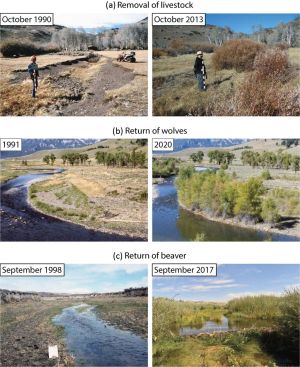Bring Back the Beaver: Difference between revisions
Jump to navigation
Jump to search
Florez4747 (talk | contribs) No edit summary |
Florez4747 (talk | contribs) No edit summary |
||
| Line 2: | Line 2: | ||
https://oaec.org/projects/bring-back-the-beaver-campaign/ | https://oaec.org/projects/bring-back-the-beaver-campaign/ | ||
= Wolves and Beavers = | |||
[[File:ReturnOfWolfAndBeaver.jpg||thumb|right|]] | |||
<Blockquote>In a paper published today in BioScience, “Rewilding the American West,” authors from CU Boulder, Oregon State University and several other institutions suggest using nearly 193,000 square miles (500,000 square kilometers) of federal lands in 11 states to establish a contiguous network based on potential habitat for the gray wolf and American beaver. Supporting those species through management changes on federal land would help control elk populations, support tree growth, boost biodiversity, improve water quality, increase carbon sequestration and restore riparian habitats, they said.<Ref>https://www.colorado.edu/today/2022/08/09/scientists-call-western-rewilding-network-support-wolf-beaver-populations-improve</Ref></Blockquote> | |||
Revision as of 18:35, 8 August 2023
https://climatewaterproject.substack.com/p/beavers-biology-and-slow-water-brock
https://oaec.org/projects/bring-back-the-beaver-campaign/
Wolves and Beavers
In a paper published today in BioScience, “Rewilding the American West,” authors from CU Boulder, Oregon State University and several other institutions suggest using nearly 193,000 square miles (500,000 square kilometers) of federal lands in 11 states to establish a contiguous network based on potential habitat for the gray wolf and American beaver. Supporting those species through management changes on federal land would help control elk populations, support tree growth, boost biodiversity, improve water quality, increase carbon sequestration and restore riparian habitats, they said.[1]
